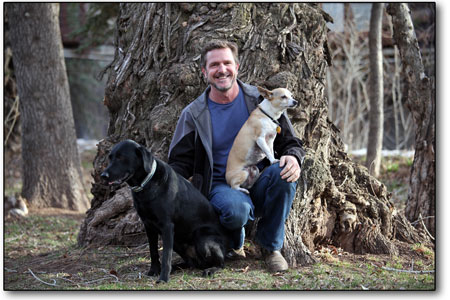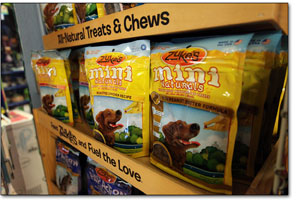|
Zuke’s Performance Pet Nutrition marketing director, Chris Meiering, poses for a photo outside Zuke’s World Headquarters in Durango along with companions, Zeke and Milo. The company was recently purchased by Nestle Purina PetCare but said it will remain a Durango-based company./Photo by Steve Eginoire |
Running with the big dogs
Zuke’s addresses concerns over buy out
by Jen Reeder
To some, the story of Durango’s pet treat company Zuke’s sounds like the epitome of the American Dream. It started in 1995 when Patrick Meiering was hiking Elbert Creek Trail with his chocolate Lab, Zuke. Meiering realized Zuke needed an energy bar as much as he did, and the idea for a natural energy bar for dogs was born.
He called his brother, Chris Meiering, and they drove around Albuquerque buying vitamin supplements, which Patrick hand blended with meat in his garage. The next year when Patrick was preparing to launch Zuke’s in Durango, he called Chris and asked, “Hey, do you know anything about this Internet?” So Chris learned to code and created a website for Zuke’s.
Since then, Zuke’s has continued to grow, expanding from the flagship product, Power Bones, to about 90 different natural, nutritional treats for dogs and cats. The products have become a familiar sight on pet store and natural grocery store shelves, not just in Durango but throughout the country. Even major chains like PetSmart and Whole Foods have sniffed them out.
“We grew by packing the original products one by one by hand … in my brother’s garage and in his living room,” said Chris Meiering, director of marketing.
But when it was announced on Jan. 15 that Nestle Purina PetCare had purchased Zuke’s Performance Pet Nutrition, shockwaves rippled through the pet community over concerns that the quality of Zuke’s products would be compromised. More than 600 former fans posted angry comments on the Zuke’s Facebook page in the first 24 hours, many swearing to never buy the brand again.
Meiering said such fears are unfounded because Nestle Purina offered virtual autonomy as part of the deal. Zuke’s currently has 18 employees based in Durango and seven selling the product “in the field,” in addition to contracting manufacturing facilities in Utah, Missouri and Pennsylvania.
“The quality is not going to change, and the people doing it are not going to change … we’re not changing recipes, we’re not changing manufacturing plants,” Meiering said. “One of the keys in bringing them onboard was they assured us they were going to run this operation out of Durango, as a Durango company, with very, very minimal oversight from St. Louis and ultimately Switzerland.”
He said the purchase will create more jobs in Durango, including positions in finance and marketing later this year. In fact, the first question asked when they were presenting Zuke’s to Nestle Purina was, “Do you have more room to expand in Durango?”
|
Zuke’s Brand dog treats sits on display at the Pet Haus in downtown Durango. Since opening in 1995, Zuke’s has expanded its offerings from the flagship product, Power Bones, to offer about 90 different natural, nutritional treats for dogs and cats. |
Meiering said that growth will also benefit the Dog and Cat Cancer Fund (DCCF), a nonprofit the Zuke’s team founded in 2008 when Zuke died of cancer at the age of 7. Zuke’s will continue to donate a portion of every sale to the organization, which gives financial assistance to people who need help paying for their pets’ cancer treatments.
“As Zuke’s grows as a brand within the Nestle Purina business, we as the Cancer Fund will grow commensurately,” Meieing said. “It’s a great feeling to know that the work we’re doing here at Zuke’s continues to support pets in need.”
Meiering said Nestle Purina donates millions every year to animal welfare charities, and he has requested that additional funds be allocated for the cancer fund. In May, Zuke’s will sponsor a social media fundraiser for the fund called “Fuel the Love, Fuel the Cure” involving Twitter, Facebook, YouTube, Vine, Pinterest and Instagram.
“It’s going to be a large campaign that will involve hashtagging a photograph of your dog doing something fun, something loving, and for every photo that’s hashtagged ‘fuel the love,’ we’ll donate $5 to the Dog and Cat Cancer Fund,” he said. “It’s just a way to help remind the customer why we have pets – it’s to do fun things with them.”
Meiering said the pet market has changed dramatically since his brother founded Zuke’s in 1996. Zuke’s continued to grow during the 2008-09 recession, as did the pet industry as a whole – something that was not lost on investors, who started approaching companies like Zuke’s.
“In 2008 and 2009, massive amounts of private equity and venture capital money was moved into the pet industry looking for returns,” Meiering said. “We saw the writing on the wall that all of this big money from outside the industry was moving into the pet industry. So we took on capital investment in 2009 and sold part of the company to a private equity firm called Encore Consumer Capital.”
Meiering said because the pet industry was able to show strong returns for investors during the recession, it has continued to grow. He said it used to be “kind of mom-and-poppy,” but now is a cutthroat industry where it is necessary to have financial resources to survive as new companies with deep pockets appear on the scene.
“To use a bad pun, it’s a dog-eat-dog world, and if you want to compete, at some point you really need to bring on resources,” he said. “Brands can grow to where we were after 10 years in one or two with a lot of financial resources behind them.”
In 2013, Zuke’s began receiving another round of inquiries from corporations and large private equity firms about whether the company was available for purchase. While the principals hadn’t been thinking about selling, the amount of “unsolicited interest” in Zuke’s alerted them to another shift in the market.
“When people start seeking you out, you know something’s going on behind the scenes in the broader industry, so we started preparing to present the company for sale in October,” Meiering said.
Nestle Purina was one of the companies that came to the table, and the transaction date soon followed on Dec. 20, 2013.
“The sale at the end of 2013 to Nestle Purina is the evolution of that need to compete in a very competitive, growing marketplace,” Meiering said. “We have a saying, ‘Every dog deserves Zuke’s,’ and that’s true, and we know we make the best products out there. So having the resources to bring it to more people, we think that’s a win/win for everyone involved.”
LeeAnn Craig, owner of Healthy Hounds and Fat Cats, a pet store/boarding facility at 21738 Hwy. 160 in Durango, said she has sold Zuke’s products since she opened her doors in 2005 and “absolutely” plans to continue doing so – as long as the quality remains consistent. She said though there was some buzz from her customers about Nestle Purina’s purchase of Zuke’s, she heard more complaints in 2012 when some of the Zuke’s packaging was redesigned with cartoon images.
“A few people are a little bit unhappy about it, but I can’t fault Zuke’s at all – it’s a good business move for them,” Craig said. “I think it’s a good indicator of how important ingredients and nutrition have become to pet owners that a huge company like Nestle would be like, ‘OK, we’d better get onboard with this.’”
Meiering said though Zuke’s lost “a handful” of retail stores after the sale and had hundreds of negative comments on Facebook after the announcement, it also gained more than 4,000 new Facebook fans in the next three weeks (currently more than 70,900). He said his brother, Patrick, is staying on in an advisory role, and the Zuke’s team is committed to safeguarding what they created.
“We just ask, let us prove it to you,” he said.
In this week's issue...
- January 25, 2024
- Bagging it
State plastic bag ban is in full effect, but enforcement varies
- January 26, 2024
- Paper chase
The Sneer is back – and no we’re not talking about Billy Idol’s comeback tour.
- January 11, 2024
- High and dry
New state climate report projects continued warming, declining streamflows


